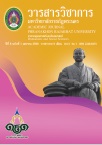กลยุทธ์การบริหารเพื่อพัฒนาคุณภาพการสอนภาษาไทย ในโรงเรียนมัธยมศึกษาตอนปลาย
Keywords:
กลยุทธ์, การบริหารเพื่อพัฒนา, การสอนภาษาไทย, โรงเรียนมัธยมศึกษาตอนปลาย, Strategies, Develop Administrative, Thai Language Teaching, Secondary SchoolsAbstract
การวิจัยมีวัตถุประสงค์ 3 ประการ คือ 1) ศึกษาสภาพการบริหารการสอนภาษาไทยใโรงเรียน
มัธยมศึกษาตอนปลาย 2) ศึกษาองค์ประกอบการบริหารเพื่อพัฒนาคุณภาพการสอนภาษาไทยในโรงเรียนมัธยมศึกษาตอนปลาย 3) พัฒนากลยุทธ์การบริหารเพื่อพัฒนาคุณภาพการสอนภาษาไทยในโรงเรียนมัธยมศึกษาตอนปลาย โดยศึกษาโรงเรียนที่มีผลการสอบ O-NET สูงวิชาภาษาไทย 50 อันดับแรก และอีก 50 โรงเรียนเป็นโรงเรียนทั่วไปที่อยู่ในเขตการศึกษาเดียวกันเครื่องมือที่ใช้ศึกษาเป็นแบบสอบถามที่ส่งไปยังโรงเรียนที่เป็นกลุ่มตัวอย่างมี
ผู้ตอบแบบสอบถามกลับมาจำนวน 500 คน แบ่งเป็น ผู้อำนวยการ 56 คน รองผู้อำนวยการ 69 คน หัวหน้ากลุ่มสาระการเรียนรู้ภาษาไทย 85 คน ครูภาษาไทย 290 คน นอกจากนี้ได้สัมภาษณ์ครูในโรงเรียนที่ได้คะแนน O-NET วิชาภาษาไทยสูง 8 โรงเรียน จำนวน 40 คน ด้านการบริหารการสอนภาษาไทยได้วิเคราะห์ข้อมูลโดยใช้สถิติพรรณนา ค่าร้อยละ ค่าเฉลี่ยน ส่วนเบี่ยงเบนมาตรฐาน สถิติ อ้างอิง คือค่า t-test ผลการวิจัย พบว่า ประการที่ 1 สภาพการบริหารการสอนภาษาไทยในโรงเรียนมัธยมศึกษาตอนปลาย ใน 11 ประเด็นที่ศึกษานั้น พบว่าทุกโรงเรียนได้ปฏิบัติครบเพียงแต่โรงเรียนกลุ่มที่ได้คะแนน O-NET สู่เน้นการกำกับดูแลการสอนและเน้นการวางแผนการสอนโดยใช้ผลการวิเคราะห์ข้อสอบ O-NET มาประกอบการวางแผนการสอน และบริหารวิชาการแบบมีส่วนร่วมโดยการทำงานเป็นทีมพัฒนาครูอย่างเป็นระบบสม่ำเสมอ ส่วนผู้บริหารโรงแรียนกลุ่มทั่วไปเน้นแผนการสอนเป็นหลัก และมิได้ใช้ผลการสอน O-NET ประกอบการวางแผนการสอน มิได้เน้นการกำกับดูแล การสอนและการพัฒนาครูมากเท่าโรงเรียนที่สอบ O-NET ได้คะแนนสูง ประการที่ 2 องค์ประกอบการบริหารเพื่อพัฒนาคุณภาพการสอนภาษาไทยในโรงเรียนมัธยมศึกษาตอนปลายนั้นพบว่า โรงเรียนที่ได้คะแนน O-NET วิชาภาษาไทยสูงกับโรงเรียนทั่วไปมีความแตกต่างอย่างมีนัยสำคัญ 7 ประเด็น คือ 1) การพัฒนาครูใหม่ความรู้ ทักษะ และเทคนิคการสอนภาษาไทย 2) การกำกับดูแลการสอนภาษาไทย 3) การสนับสนุนเสริมแรงในการทำงาน 4) การบริหารวิชาการแบบมีส่วนร่วม 5) การส่งเสริมการทำวิจัยในชั้นเรียน 6) แผนการสอนภาษาไทยที่นำผลการวิเคราะห์ข้อสอบ O-NET มาวางแผนการสอน 7) การวิจัยเพื่อพัฒนาการสอนภาษาไทยประการที่ 3 กลยุทธ์การบริหารเพื่อพัฒนาคุณภาพการสอนภาษาไทยในโรงเรียนมัธยมศึกษาตอนปลายจากการสัมภาษณ์ผู้บริหารและครู พบว่ามี 9 ประการ คือ 1. วางแผนพัฒนาครูภาษาไทย 2.บริหารวิชาการแบบมีส่วนร่วม 3. กำกับ ติดตาม ผลงานครู 4. ใช้วิจัยในชั้นเรียนเพื่อพัฒนาการสอนภาษาไทย 5. วางเกณฑ์มาตรฐานก่อนสอบคัดเลือกนักเรียน 6. พัฒนาการสอนตามแนวข้อสอบ O-NET 7. ฝึกทักษะการสื่อสารให้สอดคล้องกับทักษะในศตวรรษที่ 21 8. ปลูกฝังคุณธรรม ความมีวินัย 9.สร้างภาวะผู้นำการเปลี่ยนแปลงทั้งองค์กร
The main objectives of the research were: 1) to investigate the status of administrative strategies of Thai language teaching in secondary schools in Thailand; 2) to examine the elements of the administration for the development of Thai language teaching in secondary schools; and 3) to develop administrative strategies for enhancing the quality of Thai language teaching in secondary schools. The samples comprised of top rank 50 schools with high O-NET scores and 50 non-top schools in the same educational zones. The research instrument was a questionnaire and the number of respondents was 500, comprising of 56 school directors, 69 deputy directors, 85 heads of Thai Departments, and 290 teachers of Thai. Interviews were also conducted with 40 school staff members from the high O-NET score group. The data were analyzed using descriptive and inferential statistics, including percentage, average, standard deviation, and t-test. The findings showed that every school employed all the 11 strategies under investigation of this study. The top schools focused on Thai lesson plans, based on the analysis of the results of O-NET examination, participatory administration and teamwork. The non–top rank group focused on lesson plans too but did not use the results of O-NET examination in planning the lessons. Teaching monitoring and teacher development were not focused. The 2 groups, however, differed significantly on 7 points, namely, 7 effective supervision and monitoring, lesson plans, research for teaching development, providing professional development opportunities to teachers, providing professional development on skills and techniques for teaching Thai, facilitating participatory management or participatory administration, and facilitating in-class research. This research proposed that the administrative strategies for enhancing the quality of Thai language teaching include 1. Formulating a plan for teacher development; 2. Adopting participatory management; 3. Monitoring teachers’ performance; 4. Using classroom
Downloads
How to Cite
Issue
Section
License
"บทความวิชาการในวารสารฉบับนี้ ถือเป็นความรับผิดชอบของผู้เขียนเท่านั้น"
สงวนลิขสิทธิ์ตามพระราชบัญญัติลิขสิทธิ์




